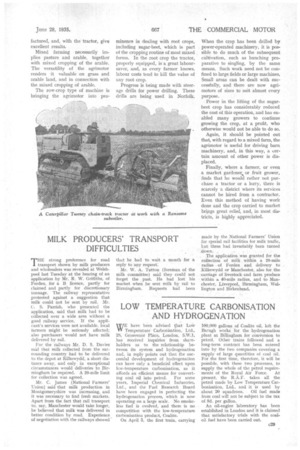LOW TEMPERATURE CARBONISATION AND HYDROGENATION
Page 79

If you've noticed an error in this article please click here to report it so we can fix it.
WE have been advised thalt Lo'W Temperature Carbonisation,. Ltd., 28, Grosvencir Place., London, S.W.1, has received inquiries from shareholderS as to the relationship between its system and hydrogenation and, in reply points out that the successful development of hydrogenation can have only a beneficial effect upon low-temperature carbonisation; as it affords an efficient means for convert ing coal oil into petrol. For some years, Imperial Chemical Industries, Ltd., and the Fuel Research Board have been engaged in perfecting the hydrogenation process, which is nowoperating on a large scale. No smokeless fuel is evolved, and there is no competition with the low-temperature carbonisation product, Coalite.
On April 5, the first train, carrying 100,000 gallons of Coalite oil, left. the Barugh works. for the hydrogenation plant at Billingham for con-Yersion to petrol. Other trains followed and a long-term contract has been entered into by the two companies covering a supply of large quantities of c.oal oil. For the first time, therefore, it will be possible, with these two processes, to supply the whole of the petrol requirements of the Royal Air Force. At present, the R.A.F. takes all the petrol made by Low Temperature Carbonisation, Ltd., and it is used by about 20 squadrons. Oil fuel made from coal will not be subject to the tax of 8d. per gallon.
An oil-engine laboratory has been established in London and it is claimed that satisfactory trials with the coaloil Fuel have been carried out.




























































































































































